Nonprofit For-Prophet Organizations
What powers in politics do nonprofit for-prophet organizations have?
Under federal tax law, 501(c)(3) organizations, which are classified as nonprofits, are prohibited from endorsing political candidates, making campaign contributions, or engaging in partisan political activities. However, these organizations can engage in nonpartisan activities, such as voter registration efforts, get-out-the-vote campaigns, and voter education, as long as they comply with IRS guidelines established in 2007. Nonprofits may also participate in discussions related to ballot measures and have the option to rent their facilities to political groups, provided they follow standard rental procedures.
Nonprofit Guidelines - Treading the line of legality
Do donors to these foundations need to be public?

Citizens United - the supreme court case that broke american democracy
The Creation of Super PACs
The Citizens United v. FEC decision in 2010 had a significant and lasting impact on campaign finance in the United States. One of the most notable effects was the dramatic increase in political spending. By allowing corporations and unions to spend unlimited amounts on independent political advertising, the ruling led to a substantial rise in overall campaign expenditures, especially from super PACs, which are independent political action committees.
dark money in politics
This decision also led to the rise of super PACs, which are now able to raise and spend unlimited funds for or against political candidates, as long as they do not coordinate directly with the candidates' campaigns. As a result, political spending became more centralized in these large, independent groups.
Another important consequence was the emergence of "dark money" in politics. Due to the ruling, certain nonprofit organizations, such as 501(c)(4) groups, are not required to disclose their donors. This has created a lack of transparency, making it difficult for voters to know who is financing political ads and initiatives.
more money = more power
The decision also shifted the power dynamics in U.S. elections, allowing wealthy individuals and corporations to exert greater influence. With no limits on financial contributions, their spending could greatly impact political outcomes, raising concerns about the fairness and integrity of the democratic process.
corporations and political financing
Finally, Citizens United set a legal precedent that influenced subsequent rulings, further expanding the scope of political spending and loosening regulations meant to limit corporate influence in politics. These changes have shaped the current landscape of political financing, with lasting implications for both campaigns and public trust in the electoral system.
The Dark Money Loophole - 501(c)(4)
Here are some of the nonprofit for-prophet organizations that are associated with Project 2025 or Christian Nationalism:
This is not an exhaustive list - groups are added as they come up in research.
Alliance Defending Freedom

What is Alliance Defending Freedom?
According to their website, Alliance Defending Freedom (ADF) is the world’s largest legal organization dedicated to defending essential freedoms such as religious liberty, free speech, marriage and family, parental rights, and the sanctity of life. Through its efforts in Congress, state legislatures, and courtrooms across the United States, including the U.S. Supreme Court, ADF works tirelessly to protect these fundamental rights.
Founded by 35 Christian leaders, ADF was established to safeguard religious freedom and ensure that the doors for the Gospel remain open. With a strong belief in the power of collaboration, ADF is not just a single entity but a unified alliance made up of attorneys, church and ministry leaders, non-profit volunteers, legislators, business professionals, and grassroots advocates, all working together to defend freedom. Since its inception, ADF has been highly successful, winning 15 cases in the U.S. Supreme Court since 2011 and maintaining an impressive success rate of nearly 80% in its cases.
Who are important key players in Alliance Defending Freedom?
Key players in Alliance Defending Freedom (ADF) include a range of individuals who have played significant roles in both the organization's legal advocacy and its connections to political and judicial circles.

Mike johnson

Amy Coney Barrett
U.S. Supreme Court Justice Amy Coney Barrett has been associated with ADF through her legal work and views on issues like religious freedom and conservative values, making her a key figure connected to the organization's mission.

Mike Pence

William Barr

Jeff Sessions

Josh Hawley
Who funds Alliance Defending Freedom?
The Servant Foundation
The Green Family
The Bolthouse Foundation
The Edgar and Elsa Prince Foundation
The Richard and Helen DeVos Foundation
The Bradley Foundation
The Charles Koch Institute
The M.J. Murdock Charitable Trust
America First Policy Institute
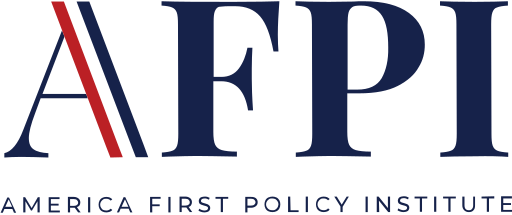
What is America First Policy Institute?
The America First Policy Institute (AFPI) is a nonprofit think tank founded in 2021 to advance Donald Trump’s policy agenda. It is led by President and CEO Brooke Rollins, former acting director of the U.S. Domestic Policy Council under Trump, and Vice Chair Larry Kudlow, Trump’s former National Economic Council director. Linda McMahon, Trump’s former SBA Administrator and chair of the pro-Trump Super PAC America First Action, serves as AFPI’s chairperson. Politico has described this group as a “White House in waiting”, and Trump’s cabinet picks so far have more direct links to the AFPI than any other organization, including the Heritage Foundation.
Who are important key players in the America First Policy Institute that are part of Trump's cabinet during his second term?
Many key players in the America First Policy Institute currently serve in the second Trump administration. They include:
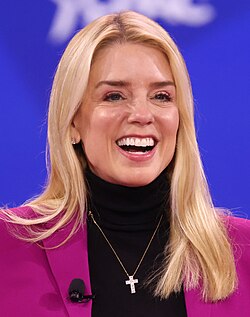
Pam Bondi
U.S. Attorney General
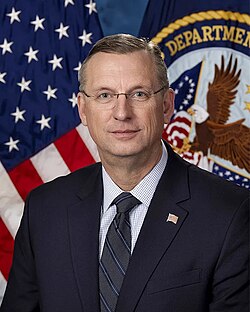
Doug Collins
Secretary of the Department of Veterans Affairs
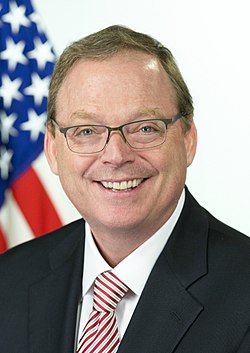
Kevin Hassett
Director of the National Economic Council

Linda McMahon
Secretary of the Department of Education
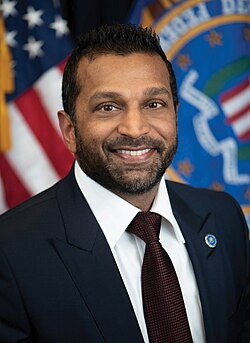
Kash Patel
Director of the FBI
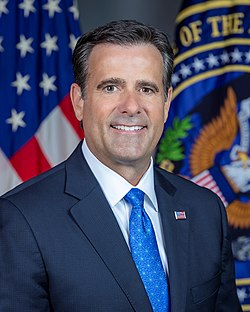
John Ratcliffe
Director of the CIA
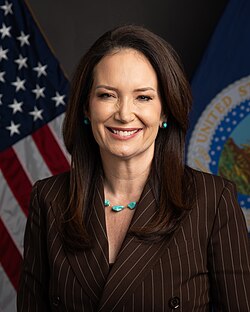
Brooke Rollins
Secretary of the Department of Agriculture
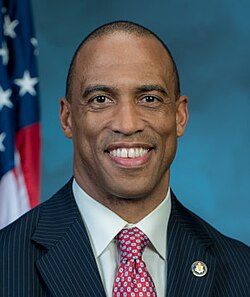
Scott Turner
Secretary of the Department of Housing and Urban Development
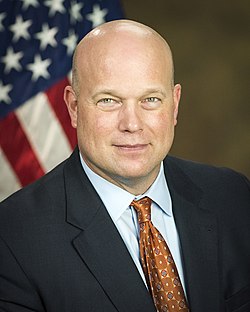
Matthew Whitaker
Ambassador to NATO
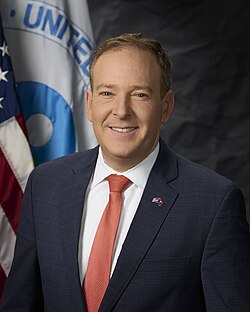
Lee Zeldin
Secretary of the Environmental Protection Agency
What is in the America First Policy Institute Policy Book?
According to New York Times reporter Ken Bensinger, key proposals from the AFPI’s policy book, The America First Agenda, include removing most civil service protections for federal employees, enabling summary dismissals without the right to appeal; increasing domestic oil and gas production by opening additional federal lands for expedited drilling and resuming Keystone pipeline construction; and implementing restrictions on abortion such as mandatory ultrasounds, waiting periods, and eliminating federal funding for organizations like Planned Parenthood. The agenda also opposes red flag gun laws and supports nationwide concealed carry permit reciprocity, allowing permits issued in one state to be valid in all 50. Additional proposals include imposing tariffs on imports, cutting corporate taxes, defending religious liberty, rolling back climate change efforts including withdrawing from the Paris Agreement, opposing transgender rights, adding work requirements to Medicaid, and reducing U.S. involvement in international conflicts. On immigration, it advocates completing the U.S.-Mexico border wall, increasing border enforcement funding, and ending legal immigration programs such as family-based visas and the diversity visa lottery.
How is America First Different From Project 2025?
American Pregnancy Association
About
The American Pregnancy Association (APA) is a non-profit organization based in Irving, Texas, focused on promoting anti-abortion views by providing information on pregnancy and reproductive health. Founded in 1995 under the name America's Pregnancy Helpline by Mike and Annie Sheaffer, who wrote a book titled The Ultimate Gift: A True Love Story. The organization initially operated as a helpline aimed at offering support and guidance to pregnant individuals. During its early years, from 1995 to 2003, the helpline served approximately 147,000 women and families, emphasizing alternatives to abortion.
In 2003, the organization transitioned from a helpline to a formal non-profit entity, rebranding itself as the American Pregnancy Association. This change marked a significant expansion in its mission, allowing it to reach a broader audience and enhance its outreach efforts. Under the leadership of Brad Imler, a prominent anti-abortion activist, the organization grew in influence and began to develop a more structured approach to its initiatives.

Leadership Changes
Brad Imler led the APA until 2019, when he departed to establish a Christian adoption agency. Following his departure, Lynn Handley took over the leadership, continuing the organization’s mission to provide resources and support to those facing unplanned pregnancies.
The American Pregnancy Association operates an informative website that offers a range of resources, including articles, FAQs, and guidance on pregnancy, prenatal care, and alternatives to abortion. This online platform serves as a critical tool for disseminating information and reaching individuals who may be seeking support or guidance during their pregnancy journey.
Controversy
The American Pregnancy Association's website has faced criticism for containing what some sources, including *Mother Jones*, have described as "rife with medically inaccurate information," raising concerns about the reliability and safety of the resources it provides to individuals seeking guidance during pregnancy. Journalists and activists have consistently labeled the organization as an anti-abortion group, highlighting its focus on discouraging abortion through the promotion of alternative options and its framing of pregnancy-related information. This characterization underscores the organization’s alignment with specific ideological beliefs that prioritize anti-abortion stances, which critics argue may compromise the objectivity and accuracy of the information presented on its platform, potentially impacting the well-being and decision-making of those seeking assistance.
Christian Coalition of America
About
The Christian Coalition of America (CCA) is a 501(c)(4) organization that serves as the successor to the original Christian Coalition founded in 1987 by religious broadcaster and former presidential candidate Pat Robertson. This advocacy group encompasses a diverse membership from various Christian denominations, including Baptists (50%), mainline Protestants (25%), Roman Catholics (16%), and Pentecostals (10% to 12%), among others. The CCA aims to influence public policy and promote Christian values in American society.
Voter Guides
Result


Office of Congressman Walter Jones, Public domain, via Wikimedia Commons
Family Research Council
About
The Family Research Council (FRC) is an American evangelical nonprofit organization and think tank established in 1981 by James Dobson. It advocates for what it defines as family values and actively opposes issues such as pornography, embryonic stem-cell research, abortion, divorce, and various LGBT rights, including anti-discrimination laws, same-sex marriage, and adoption by same-sex couples. The FRC has faced significant criticism from media outlets and professional organizations like the American Sociological Association for using what they describe as "anti-gay pseudoscience" to falsely link homosexuality with pedophilia and to claim that children of same-sex parents experience higher rates of mental health issues.
FRC is a member of the advisory board of Project 2025
Tax status

Family Research Council Building - APK, CC BY 4.0 <https://creativecommons.org/licenses/by/4.0>, via Wikimedia Commons
Uganda Anti-Homosexuality Bill:
Josh Duggar

Josh Dugger - AP News <https://apnews.com/article/josh-duggar-supreme-court-f6aa13a174998b5f89614468f924925f>
Focus on the Family
About
What is the Organization Known For?

David Shankbone, CC BY-SA 3.0 <http://creativecommons.org/licenses/by-sa/3.0/>, via Wikimedia Commons

U.S. Department of State, Public domain, via Wikimedia Commons
Mike Pence
James Dobson Controversy
U.S. Surgeon General C. Everett Koop, an evangelical Christian, was disappointed by James Dobson's embrace of pseudoscientific and homophobic claims about AIDS, criticizing his approach during the crisis. Koop viewed the AIDS epidemic as a chance for Christian service that Dobson squandered, calling out the actions of Dobson and fellow evangelist D. James Kennedy as "reprehensible" in 1989.
In her book Jesus and John Wayne, Kristin Kobes Du Mez critiques the vision of Christian masculinity promoted by Dobson and others, arguing it promised protection for women while ultimately failing to uphold justice. Former Focus on the Family executive Gil Alexander-Moegerle similarly lambasted Dobson in his book James Dobson's War on America, portraying him as hypocritical and power-hungry. Theologian Donald Eric Capps condemned Dobson's methods of corporal punishment, arguing they exploit children's needs for love and could lead to abuse, asserting that such techniques contradict the principles of nurturing a loving parent-child relationship.

c.berlet/publiceye.orghttp://www.publiceye.org/gallery, CC BY-SA 3.0 <https://creativecommons.org/licenses/by-sa/3.0>, via Wikimedia Commons
Gays Against Groomers
About
Gays Against Groomers (GAG) is an American far-right and anti-LGBT organization that campaigns against gender-affirming care for minors, protests LGBT-themed school curricula, and criticizes events like Drag Queen Story Hour. The group also opposes trans women in women’s sports, children attending pride events, and brands that promote LGBT representation during Pride Month.
Founded
Founded in June 2022 by Jaimee Michell, GAG started as a Twitter account and has since been incorporated. Michell, who has a background in right-wing communications, has used the account to share anti-trans rhetoric, drawing comparisons to the Libs of TikTok account. GAG has faced bans from multiple social media and payment platforms for hate speech violations and has received coverage from right-wing media outlets such as Fox News and OANN.
Controversy:
Organizations like GLAAD and the ADL have criticized GAG for using the term "groomer" to perpetuate harmful conspiracy theories about the LGBT community. GAG has also helped organize anti-LGBTQ rallies, partnering with other far-right groups such as Moms for Liberty and the Proud Boys, positioning itself within the broader anti-LGBT movement in the U.S. during the 2020s.
Appearance in Conservative Media
In an August 2022 interview with OANN, Gays Against Groomers founder Jaimee Michell drew a controversial comparison between gender-affirming care and the experiments conducted by Nazi doctor Joseph Mengele on Auschwitz prisoners. Alex Bollinger, writing for LGBTQ Nation, criticized this remark, highlighting that the Nazis destroyed Magnus Hirschfeld's Institute of Sexology, which was instrumental in advancing understanding of LGBTQ identities, including transgender issues.
On November 8, following the Colorado Springs nightclub shooting that left five dead, including two trans individuals, Michell attributed the violence to gender-affirming care. During an appearance on Tucker Carlson Tonight, she described the shooting as "expected and predictable" and suggested that violence would continue until what she termed the "evil agenda attacking children" was halted. Brandon Wolf, a survivor of the Orlando nightclub shooting and press secretary for Equality Florida, condemned Michell's comments as a "crystal clear threat," implying that violence would persist until her demands were met.
Government Accountability Institute
About
Why was it created?

Steve Bannon at a Heritage Foundation Bloggers Briefing - October 19, 2010 - Don Irvine, CC BY-SA 2.0 <https://creativecommons.org/licenses/by-sa/2.0>, via Wikimedia Commons
Activities
Links to Breitbart News

Hillsdale College
About
Radio Free Hillsdale and Hillsdale Podcasts
In this video, Richard Lowery of Hillsdale College spouts off suggestions that are also in Project 2025 (About 24:30) when describing Policy Ideas to Fix Americans Universities
- Complete and total legislative removal of all DEI, CRT, and queer theory from all positions of administrative power in universities. Three things we need to do:
- An ideological purge is necessary because those ideas are fundamentally incompatible with the idea of free inquiry or the functioning of a university. We have to stop trying to be nice to people and get it done. And that means remove the ideas and remove the people.
- We have to remove anything with these ideas from the required curriculum for graduation at at least a public university.
We have to create independent institutions not just outside but within the universities. We can rebuild history outside of the universities, there are donors who will do that. We need these institutions to help students satisfy graduation requirements without having to go to the “insane people”

Michael Anton
Anton was on a podcast called The American Mind with none other than Curtis Yarvin (Mencius Moldbug) of who many tech billionaires subscribe to his ideology - and is shown in the Claremont Institute’s Youtube Channel.
Michael Anton appeared on Fox News (with Tucker Carlson), where they mentioned his book titled “The Stakes” before discussing the “voter fraud” that inspired the January 6 Insurrection
Michael Anton wrote a book, The Stakes: America at the Point of No Return
“The Flight 93 Election”, Michael Anton’s 2016 essay reaching out to Republicans against Hilary Clinton, is hosted on the Claremont’s website
Michael Anton - Elekes Andor, CC BY-SA 4.0 <https://creativecommons.org/licenses/by-sa/4.0>, via Wikimedia Commons
Patriot Front
About
Patriot Front is a white nationalist extremist group in the United States, known for its promotion of a white supremacist ideology. It was formed in 2017 after the Unite the Right rally in Charlottesville, Virginia, as a successor to a previous organization, Vanguard America. The group advocates for a return to a “white America” and uses propaganda, public demonstrations, and vandalism to promote its message.
Characterizations
Patriot Front is characterized by its secretive nature and its focus on grassroots activism, often engaging in coordinated efforts to distribute flyers and stickers in various communities. The group has been involved in several high-profile incidents and has attracted significant scrutiny from law enforcement and civil rights organizations, including the Southern Poverty Law Center and the Anti-Defamation League.
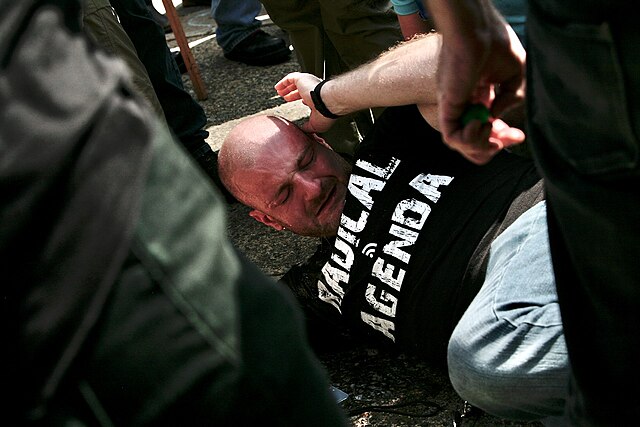
Christopher Cantwell at Unite the Right - pepper sprayed - Shawn Breen, CC BY-SA 4.0 <https://creativecommons.org/licenses/by-sa/4.0>, via Wikimedia Commons
Manifesto
The group published a manifesto which contained passages including: "Those of foreign birth may occupy civil status within the lands occupied by the state, and they may even be dutiful citizens, yet they may not be American. Membership within the American nation is inherited through blood, not ink. Even those born in America may yet be foreign...Nationhood cannot be bestowed upon those who are not of the founding stock of our people, and those who do not share the common spirit that permeates our greater civilization, and the European diaspora...In order to survive as a culture, a heritage, and a way of being, our nation must learn that its collective interests are fighting against its collective threats of replacement and enslavement...The damage done to this nation and its people will not be fixed if every issue requires the approval and blessing from the dysfunctional American democratic system. Democracy has failed in this once great nation."
The Proud Boys
About
The Proud Boys is a North American far-right, neo-fascist militant organization that engages in political violence. Its leaders have faced convictions for violently opposing the U.S. federal government, particularly during events like the January 6 Capitol attack. The group is known for its opposition to left-wing and progressive movements and is openly supportive of former President Donald Trump. Although Proud Boys leadership denies being a white supremacist organization, the group has connections to white supremacist ideologies and events.
Founding
Founded in 2016 by Gavin McInnes, a co-founder of Vice Media, the Proud Boys emerged from the far-right Taki's Magazine and derived their name from a song called “Proud of your Boy” from Disney's Aladdin. While initially part of the alt-right movement, McInnes later distanced the Proud Boys from that label, positioning them as "alt-lite." Trump's remark during a 2020 presidential debate—"Proud Boys, stand back and stand by"—boosted the group's visibility and recruitment, although he later condemned them.

Proud Boys in Raleigh NC - Anthony Crider, CC BY 2.0 <https://creativecommons.org/licenses/by/2.0>, via Wikimedia Commons
Ideology
The group promotes a belief that traditional masculinity and Western culture are under attack, often using "Western chauvinism" as a euphemism for conspiracy theories about white genocide. Members have participated in racist events and actions against leftist and socialist groups. The Southern Poverty Law Center (SPLC) describes the group as an "alt-right fight club" and a hate group, while the Anti-Defamation League (ADL) labels them as "extremist conservative" and "alt-lite," highlighting their Islamophobia, misogyny, and willingness to embrace various forms of bigotry.

Gavin McInnes on Steven Crowder -
StevenCrowder, CC BY 3.0 <https://creativecommons.org/licenses/by/3.0>, via Wikimedia Commons
Connections with Roger Stone
Republican Dorchester Conference
In early 2018, Roger Stone sought the Proud Boys' assistance as security for his appearance at the Republican Dorchester Conference in Salem, Oregon, where he was photographed socializing with them. The Proud Boys later shared a video on Facebook that they described as Stone undergoing a "low-level initiation," where he declared himself a "Western chauvinist" and became a "first-degree" member, a title characterized by some as that of a sympathizer. Stone has denied being an actual member of the group.
Mueller Investigation
After Stone's arrest by the FBI in January 2019 in connection with the Mueller investigation, Enrique Tarrio, the Proud Boys' chairman, met him outside the courthouse wearing a "Roger Stone Did Nothing Wrong" shirt. Tarrio dismissed the charges against Stone as "trumped-up" and was later seen visiting him at home. A small group demonstrated in D.C. during Stone's arraignment, carrying signs supporting him and promoting the InfoWars conspiracy site.
Gavin McInnes - The Proud Boys Founder
Gavin McInnes stated that Stone was one of three approved media figures permitted to discuss the group. When asked about his alleged initiation, Stone dismissed the question and insulted the reporter. He has maintained a close relationship with Tarrio, who has monetized his position in the group.
Roger Stone & January 6
In February 2021, reports emerged that the FBI was investigating Stone’s potential influence on the Proud Boys and Oath Keepers regarding their roles in the Capitol attack. The United States House Select Committee on the January 6 Attack also uncovered connections between Stone and the Proud Boys.
Turning Point USA
About
Turning Point USA (TPUSA) is an American nonprofit organization founded in 2012 by Charlie Kirk and Bill Montgomery, focused on promoting conservative politics at high schools, colleges, and universities. It has become the fastest-growing organization for campus chapters in the U.S. and is recognized as a leading force in campus conservatism.
Professor Watchlist
In 2016, TPUSA launched the Professor Watchlist, a website that lists academic staff accused of discriminating against conservative students and promoting leftist views. The organization also seeks to influence student government elections to counter liberalism on campuses. In 2021, it introduced the School Board Watchlist, highlighting school board members who have implemented mask mandates or anti-racist curricula.
Conferences
TPUSA organizes several annual conferences, including the Student Action Summit, Young Women's Leadership Summit, Young Black Leadership Summit, and AmericaFest. The organization is supported by conservative donors and foundations, as well as Republican politicians.

David Shankbone, CC BY-SA 3.0 <http://creativecommons.org/licenses/by-sa/3.0/>, via Wikimedia Commons
Charlie Kirk
In a 2015 speech at the Liberty Forum of Silicon Valley, Charlie Kirk revealed that he had applied to the United States Military Academy at West Point but was not accepted. He claimed that the slot he believed he deserved went to "a far less-qualified candidate of a different gender and a different persuasion," a statement he later characterized as sarcasm in a 2017 interview with The New Yorker. However, at a TPUSA event in New Hampshire in 2019, he denied ever making that claim. Kirk's remarks have drawn scrutiny and sparked debate about his views on qualifications and diversity in military admissions.
Kirk has played a significant role in Republican politics, notably addressing the 2016 Republican National Convention. Although he expressed ambivalence about Donald Trump during the campaign, he ultimately supported him and assisted with logistics for Donald Trump Jr. Additionally, former TPUSA employees have alleged collusion between Kirk, high-ranking TPUSA staff, and the presidential campaigns of Ted Cruz and Marco Rubio, including efforts to mobilize student volunteers for these campaigns. Kirk later became CEO of Students for Trump and was a keynote speaker at the 2020 Republican National Convention, where he praised Trump as the "bodyguard of western civilization."
As of 2025, Charlie Kirk was assassinated while in Utah. This is a developing story and will have its own page/post.
